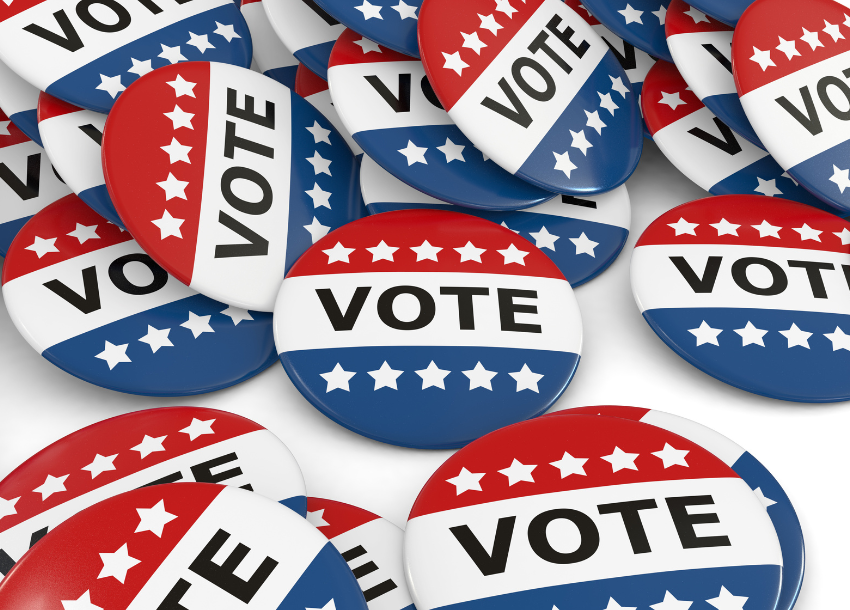An Election Year Reminder to Employers: Know Your State’s Voting Leave Laws
2024 is an election year, which brings with it challenges in the workplace and legal considerations for employers. As the year progresses, employers should be mindful of state laws concerning voting leave for employees, including whether that leave is paid, what notice employees must provide to utilize the leave, any applicable exceptions, and the potential legal penalties for violations of these laws. Now is the ideal time for employers—particularly those employers with employees located in multiple states—to review and update their internal policies and handbooks to ensure compliance with applicable state laws. Below is a state-by-state guide to relevant laws concerning state voting leave laws applicable to employees who are eligible to vote.
States Requiring Paid Voting Leave:
Alaska
Alaska law requires employees to take as much paid working time off as will enable voting, if the employee does not have sufficient time outside working hours within which to vote in a state election. Employers are not required to provide paid leave if the employee has 2 consecutive hours in which to vote between the opening of the polls and the beginning of the employee’s regular working shift, or between the end of the employee’s regular working shift and the closing of the polls. Alaska Stat. § 15.15.100.
Arizona
Arizona law requires that an employee be permitted paid time off to vote in a primary or general election if the employee less than 3 consecutive hours between the opening of the polls and the beginning of his or her regular shift, or between the end of the employee’s regular work shift and the closing of the polls. The required time off should provide the employee at least 3 consecutive hours to vote, when combined with the time difference between the employee’s work shift hours and the opening or closing of the polls. The employee should notify the employer of the need for the absence before the day of the election, and the employee may specify the hours of the employee’s absence. Ariz. Stat. § 16-402.
California
California law requires that employees be provided up to 2 hours of paid time off to vote, if the employee does not have sufficient time outside of working hours to vote in a statewide election. The time off for voting should only be at the beginning or end of the regular working shift, whichever allows the most free time for voting and the least time off from work. The employee should provide 2 working days’ notice of the need for the leave. CA Elections Code § 14000.
Colorado
In Colorado, employees are entitled to 2 hours of paid time off to vote, and the employee must request the leave prior to the day of the election. An employer may specify the hours the employee may be absent, and if the employee requests, the hours must be at the beginning or end of a shift. An employee is not entitled to paid time off to vote if he or she has 3 or more hours between the opening and closing of the polls during which the employee is not required to be at work. CO Code § 1-7-102.
Illinois
General or Special Elections: An employee is entitled to 2 hours of paid time off to vote in a general or special election, or an election at which propositions are submitted to a popular vote. The employee must request the leave prior to the date of the election, and the employer may specify the hours the employee may be absent. An employee is only entitled to leave if the employee’s working hours begin less than 2 hours after the opening of the polls and end less than 2 hours before the closing of the polls. 10 Ill. Compiled Statutes § 5/17-15.
Primary Elections: An employee is entitled to 2 hours of time off in order to vote in a primary election, with an employer’s consent, and the employer may specify the hours the employee may be absent. The statute does not specify whether the leave should be paid or unpaid. 10 Ill. Compiled Statutes § 5/7-42.
Iowa
In Iowa, employees are entitled to paid time off to vote in an amount that will provide the employee at least 3 consecutive hours, in addition to the employee’s non-working time, in order to vote. The employer may specify the hours for the employee’s absence, and employees must apply for the absence in writing prior to the day of the election. Iowa Code § 49.109.
Kansas
In Kansas, an employee may take up to 2 paid hours off to vote, and the employer may specify the times when the employee may be absent from work, excluding the regular lunch period. An employee is only entitled to be absent for such a period of time which, when added to his or her non-working time during which the polls are open, will provide the employee with 2 consecutive hours of time to vote. Kan. Stat. Ann. § 25-418.
Maryland
In Maryland, employees are entitled to up to 2 hours of paid time off to vote, if the employee does not have 2 continuous hours of time outside of working hours during which the polls are open. An employee utilizing this voting leave must provide the employer proof that the employee voted or attempted to vote. Md. Election Law Code § 10-315.
Minnesota
In Minnesota, employees are entitled to paid time off to vote, in an amount that allows them to go to their polling place, vote, and return to work on the date of the election. MN Stat. § 204C.04.
Missouri
In Missouri, employees are entitled to 3 hours of paid time off to vote in an election, unless the employee has 3 successive hours to vote when the polls are open and the employee is not working. The employee must request the leave prior to the day of the election, and the employer may specify the hours when the employee may take the leave. MO Rev. Stat. § 115.639.
Nebraska
In Nebraska, employees are entitled of up to 2 consecutive hours of paid time off to vote when the polls are open, when combined with the employee’s non-working time. The employee must request the leave prior to the date of the election, and the employer may specify the hours the employee is able to be absent. NE Code § 32-922.
Nevada
In Nevada, employees are entitled to paid time off to vote, and the amount of paid time off depends on the distance between the employee’s place of employment and polling place:
- 1 hour if polling place is within 2 miles of place of employment
- 2 hours if polling place is within 2-10 miles of place of employment
- 3 hours if polling place is more than 10 miles of place of employment
The employer may specify the time the employee may be absent from work, and the employee must apply for leave prior to the date of the election. NV Rev. Stat. § 293.463.
New Mexico
In New Mexico, employees are entitled to 2 hours of paid time off, unless the employee’s work day begins more than 2 hours after the polls opens or ends 2 hours before the polls close. Employers may specify the hours an employee may take the leave. NM Stat. § 1-12-42.
New York
In New York, employees are entitled to up to 2 hours of paid time off in order to vote, if the employee does not have sufficient time to vote outside of their scheduled working hours. Four consecutive hours between the opening of the polls and the start of the employee’s shift or between the end of the employee’s shift and the closing of the polls is considered “sufficient” time to vote outside of scheduled working hours. Any time off should be at the beginning or end of the employee’s shift, unless otherwise agreed. Employees should give 2-10 working days’ notice of the need for leave before the date of the election. NY Elec L. § 3-110.
Oklahoma
In Oklahoma, the employer must grant employees 2 hours of time while the polls are open to vote, unless an employee needs additional time due to his or her distance from the polling place, and then the employer must provide “sufficient” time. Any necessary leave must be paid, and the employer may designate the hours of the employee’s absence. An employer is not required to provide voting leave if the employee’s shift begins at least 3 hours after the polls open or ends at least 3 hours before the polls close. An employee must notify the employer orally or in writing of his or her intention to be absent prior to the day of the election. Okla. Stat. Ann. Tit. 26, § 26-7-101.
South Dakota
In South Dakota, an employee is entitled to 2 consecutive hours of paid time off in order to vote, unless the employee has 2 consecutive hours when the polls are open and the employee is not required to be at work. The employer may specify the hours when the employee may be absent. SD Codified L § 12-3-5.
Tennessee
In Tennessee, employees are entitled to up to 3 hours of paid time off to vote, unless the employee’s shift begins 3 or more hours after the opening of the polls or ends 3 or more hours before the closing of the polls. The employee should request any necessary leave by 12:00pm on the day before the election, and the employer may specify the hours the employee may be absent. TN Code § 2-1-106.
Texas
In Texas, employees must be provided paid leave in order to vote, but the statute does not specify a threshold amount of time. An employer is not required to permit leave if the polls are open on the day of the election for 2 consecutive hours outside of an employee’s working hours. Tex. Elec. Code Ann. § 276.004.
Utah
In Utah, employees are entitled to up to 2 hours of paid leave to vote, unless the employee has 3 or more hours they are not required to be at work while polls are open. The employee must apply for this leave prior to election day. Employers may specify the hours for the employee’s absence, but must grant an employee’s request to take the leave at the beginning or end of a shift. Utah Code § 20A-3a-105.
Washington, D.C.
In Washington, D.C., employees are entitled to take at least 2 hours of paid time off to vote. The employer may specify the hours for the employee’s absence, and may require the employee to request the leave a reasonable time in advance. DC Code § 1-1001.07a.
West Virginia
In West Virginia, employees are entitled to up to 3 hours of paid time off to vote, unless the employee fails to vote or has 3 or more hours outside of scheduled working time during the hours the polls are open. The employee must make the leave request in writing at least 3 days in advance. WV Code § 3-1-42.
Wyoming
In Wyoming, an employee is entitled to 1 hour of paid time off to vote, unless the employee has 3 or more consecutive non-working hours while the polls are open. The employer may specify the hour for the absence, except for the employee’s meal hours. WY Stat. § 22-2-111.
States Requiring Unpaid Voting Leave:
Alabama
Alabama law requires employers to provide an employee who is a registered voter and provides the employer with reasonable notice to take up to 1 unpaid hour off to vote in a primary or general election. If an employee’s shift begins at least 2 hours after the polls open or ends at least 2 hours before the polls close, the employer does not have to provide leave. Ala. Code § 17-1-5.
Arkansas
Arkansas law requires that an employer must schedule the work hours of employees on election days so that employees have an opportunity to exercise the right to vote. The statute does not specify any required threshold amount of time off or whether that time should be paid. An employer violating this law will be subject to a fine between $25 and $250. Arkansas Code § 7-1-102.
Georgia
In Georgia, employees must be allowed necessary unpaid time off to vote, not to exceed 2 hours. If the employee’s shift begins at least 2 hours after the polls open or ends at least 2 hours before the polls close, the employer is not required to provide voting leave. The employee must provide the employer with reasonable notice of the need to be absent, and the employer may specify the hours when the employee may take the voting leave. Ga. Code Ann. §§ 21-2-404, 21-2-598.
Kentucky
In Kentucky, employees must be allowed a reasonable, unpaid time off to vote, not less than four hours between the opening and closing of the polls. Employers may specify the hours during which the employee may be absent, and the employee must apply for leave prior to the day of the election. Ky. Rev. Stat. Ann. § 118.035.
Massachusetts
In Massachusetts, manufacturing, mechanical, and mercantile employers must provide employees who apply for a leave of absence with 2 hours of unpaid time off after the opening of the polls. MA Gen. L. ch 149 § 178.
Ohio
In Ohio, employees must be allowed a reasonable, unpaid time off to vote. The statute does not specify a threshold amount of time. Ohio Rev. Code Ann. § 3599.06.
Wisconsin
In Wisconsin, employees are entitled to up to 3 successive hours of unpaid time off to vote. The employee must notify the employer of the absence prior to the date of the election, and the employer may designate a time for the absence. WI Stat. § 6.76.
States Without a Voting Leave Law:
The following states have no voting leave laws: Connecticut, Hawaii, Idaho, Indiana, Louisiana, Maine, Michigan, Montana, New Hampshire, New Jersey, North Carolina, Oregon, Pennsylvania, Rhode Island, Vermont, Virginia, and Washington.
The following states have no voting leave laws, but have relevant laws affecting an employee’s right to vote and employment:
- Delaware: Delaware does not have a voting leave law. However, Delaware prohibits a person or corporation from hindering, controlling, coercing, or intimidating a voter regarding the individual’s right to vote, which includes threatening to deprive them of employment. Violation of this law carries a $500 penalty. 15 DE Code § 5162.
- Florida: Florida does not have a voting leave law. However, Florida prohibits an employer from firing or threatening to fire an employee for voting or not voting in an election. A person who violates this law is guilty of a felony of the third degree. FL Stat. § 104.081.
- Mississippi: Mississippi has no voting leave law. However, Mississippi law prohibits employers from interfering with the political rights of employees. MS Code § 79-1-9. Mississippi law also states that an employee may be allowed vacation time or a leave of absence in order to vote in an election. MS Code § 23-15-871(3).
- North Dakota: North Dakota has no voting leave law. However, North Dakota law encourages employers to establish a program by which employees may take time off in order to vote in an election. ND Century Code 16.1-01-02.1.
- South Carolina: South Carolina has no voting leave law. However, South Carolina law states that an employer cannot fire an employee for exercising his or her political rights. C. Code Ann. § 16-17-560.
For additional information about state voting leave laws, contact any member of Maynard Nexsen’s Employment and Labor Law Team.
About Maynard Nexsen
Maynard Nexsen is a full-service law firm with more than 550 attorneys in 24 offices from coast to coast across the United States. Maynard Nexsen formed in 2023 when two successful, client-centered firms combined to form a powerful national team. Maynard Nexsen’s list of clients spans a wide range of industry sectors and includes both public and private companies.







